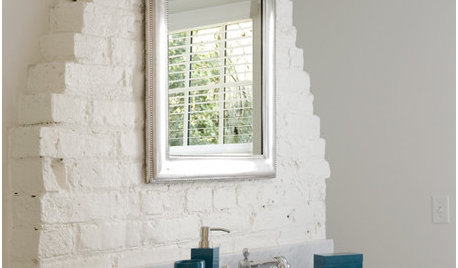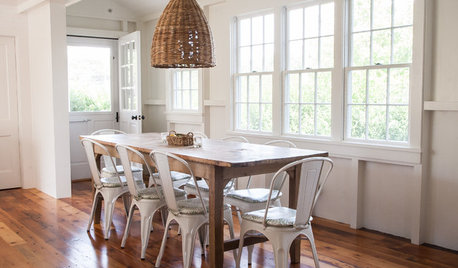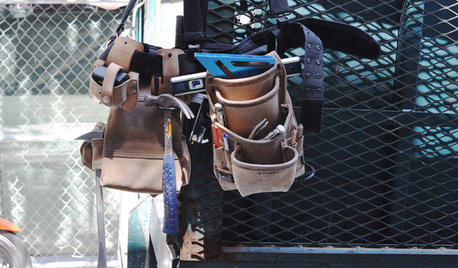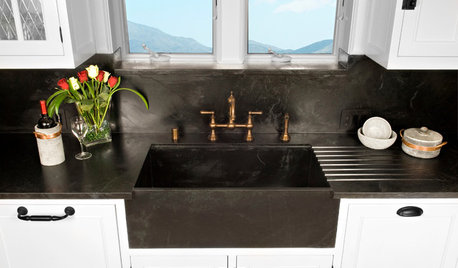Cheap and Free ways to start vermicomposting
plumiebear
13 years ago
Featured Answer
Sort by:Oldest
Comments (9)
borderbarb
13 years agolast modified: 9 years agopjames
13 years agolast modified: 9 years agoRelated Discussions
Wanting to start small, really small, and cheap
Comments (16)I just transferred my worms from the transport container that I got them in from a Freecycler last Wednesday. Quantity? No clue, but the industrial sized mayo pitcher was full of bedding and worms and a few recognizable bits of kitchen scraps. I left them in their container until tonight. I was waiting on my copy of WEMG to get in from Amazon to see how sensible my idea was for their new home. I have two topless sterlite bins, came with the holes all the way around already, just no drainage at the very bottom, sitting inside a 31 qt rubbermaid 6.5" tall bin, for now. The volume of worms and bedding that were in that mayo container was deceptive -- I really thought I'd only have enough material to fill one of the baskets. The first basket got some crushed eggshells and half a handful of coffee grounds on bottom, a little bit of mushy apple as a welcome home, then filled the rest of the basket with the used bedding and worms, and a sprinkle of UCG. Basket two has coffee grounds and filter on bottom, some mushed apple, and half of the remaining stuff from the original container. Handful of shredded computer paper because the bedding was super moist but also super clumped and wadded, then a few pieces of egg carton to take up some of the moisture from the rest of the bedding that I added. Sprinkle of UCG, then covered both of them with a damp piece of newspaper to keep in moisture. The lid to the outer rubbermaid bin is just sitting on top, cracked, to provide ventilation, and the whole contraption is in the bottom of our bathroom closet. I have a temp sensor inside the rubbermaid bin - in the morning, I'll check for temp and humidity. And that's what I'm trying. Any opinions on my small-ish start? The bins came from Target on sale. The worms were free. WEMG was $8, so I have less than $25 in the whole experiment....See Morestarting vermicomposting
Comments (3)Hey Juli, At one point I looked into selling the extra compost I generated, but I haven't done it because the reality is that the best compost is quite damp and thus very heavy to put through the mail - the shipping would be too expensive. On the other hand, to dry it is a long, tedious, and/or expensive process. However, more and more local garden stores are starting to stock local products like this. Most of the gigantic companies sell bags of dry (and thus relatively useless but cheap-to-ship) vermicompost. If you can create a superior local product at a comparable price, most independent garden stores will probably be interested, though I wouldn't expect to make a lot of money. As I've looked online at different worm companies, I often see that they give away the compost for free or for a pittance, but never ship it (ex: $5 for a 10-gallon bucket, bring-your own bucket) simply because they cannot make any money on the compost once they have to start drying it, shipping it or trucking it. While I had big dreams of selling compost, I've now simply started giving it to relatives, friends and neighbors. It feels good to be doing something good for the planet. In return, their friendship, thank-you gestures, and sheer delight at getting "black gold" for free are more rewarding to me than the $10 or less per cubic yard I would make otherwise. At one point I went to a local garden swap and I brought 20 quart-sized yogurt containers full of still-damp, freshly-harvested vermi-compost. The people there snapped it up in a heartbeat. They kept marvelling to each other, "This is black gold! Do you know how much this is WORTH?!" And yet in reality, it would be very hard to get whatever they thought it would be worth, except at very small venues such as the swap. Others on this forum may have had very different experience, and I'm sure they'll share their wisdom with you. I hope that you'll take from my experience what you like and leave the rest. However you move forward, good luck to you and let us know how it goes!...See MoreStarting vermicomposting
Comments (19)Update: I deliberately left the bin alone apart from the occasional whiff and look from the outside. Then last week, I looked into it, poking around a bit. Didn't notice a single worm, so I assumed the few that were there had died. So I decided to move the whole thing to a bigger tub and add more stuff to build some mass so that it would at least compost somewhat better. I added my browns and greens (pathetically fewer than I'd imagined before starting) and upended the bin on the lot.... and at once saw some 6-8 worms and some that could be really small earthworms or something else. Facepalm. They were growing, just that I hadn't seen them in the middle of all the half decomposed stuff. So now I have a much larger bin for them to lose themselves in :/ Someone assured me that initially they may seem like they are growing very slowly, but "give it a couple of months" and they'll seem to boom because they grow exponentially if the bin is comfortable for them, which mine seems to be. She should know. She went from half a pound of earthworms to selling vermicompost :O So now, I am essentially back to keeping the (larger) bin out of the sun and ignoring it... but I am very happy that the worms seem to be happy :p...See MoreCheap Vermicomposting Bin?
Comments (4)You can make a bin for free, if you have a place on your property where a pit can go. If it's in open contact with the ground you can pile leaves, shredded paper, or some other kind of bedding. Bury you food beneath that bedding, and wait for the worms to show up. It takes more time, but it's free. You can also make bins from just about anything you have laying around, or buy a non-see-through rubbermaid type tote and drill holes for drainage and ventilation. Just look at the bins you see for sale, that you like, and figure out a way to duplicate it yourself....See Moreeaglesgarden
13 years agolast modified: 9 years agoiammarcus
13 years agolast modified: 9 years agopjames
13 years agolast modified: 9 years agoplumiebear
13 years agolast modified: 9 years agoellicottcitycathy
13 years agolast modified: 9 years agotobytub
13 years agolast modified: 9 years ago
Related Stories

BATHROOM DESIGN15 Cheap and Easy Ways to Makeover Your Bathroom
Makeover Magic Can Happen When You Think Outside the Bathroom Box
Full Story
BUDGET DECORATING15 Ways to Ready a Summer Home on the Cheap
Set up a comfy getaway where stress goes down the drain, without sending wads of cash along with it
Full Story
DECORATING GUIDESHow to Decorate When You're Starting Out or Starting Over
No need to feel overwhelmed. Our step-by-step decorating guide can help you put together a home look you'll love
Full Story
GARDENING GUIDES5 Easy Ways to Break Free of a Gardening Rut
Experience your garden in a whole new way — no big budget or major effort required — with these invigorating ideas
Full Story
BUDGET DECORATING21 Free Ways to Give Your Home Some Love
Change a room’s look or set a new mood without spending anything but a little time
Full Story
MOST POPULAR10 Things to Ask Your Contractor Before You Start Your Project
Ask these questions before signing with a contractor for better communication and fewer surprises along the way
Full Story
KITCHEN DESIGNKitchen Sinks: Soapstone for Germ-Free Beauty and Durability
Stains and bacteria? Not on soapstone's watch. But this sink material's benefits don't come cheap.
Full Story
GARDENING GUIDESGet on a Composting Kick (Hello, Free Fertilizer!)
Quit shelling out for pricey substitutes that aren’t even as good. Here’s how to give your soil the best while lightening your trash load
Full Story
BUDGET DECORATING10 Beautiful, Decorative Gifts to Make on the Cheap
Save money while spreading the love with these personal DIY projects (pssst ... you can even keep them for yourself)
Full Story
BUDGET DECORATINGEasy, Beautiful, Cheap: Managing the 3 Points of Home Projects
When you're decorating or building, it helps to be realistic about what's possible. Here are some equations to ponder
Full Story


piranhafem